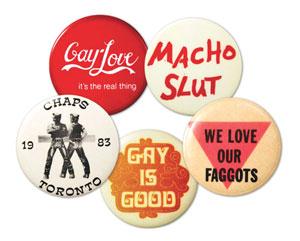While reading Sarah Schulman’s excellent The Gentrification of the Mind recently, I was struck by an image she presented: that of walking past an apartment in a particularly gay section of NYC and seeing someone’s collection of theatrical playbills abandoned on the street. She realized the gay man who compiled those programs over decades had died and the new tenant of the apartment had no real choice but to throw them out.
I was touched by this passage because it seemed the perfect metaphor for the lives of so many gay people who vanish from this world without anyone to pass their treasured possessions on to.
I am a pack rat. I suspect it comes from my Dickensian-ly peripatetic childhood where the moves were frequent and the purges of “unnecessary” items (basically, anything belonging to the children) merciless. As soon as I was old enough to stand up for myself I refused to allow practically anything I enjoyed to leave my possession. It started with comic books but eventually went on to include books, albums, silly and exquisite objets d’art and various other things.
Then one night, in my mid-40s, I had the gift of seeing my memorabilia-laden apartment through the eyes of someone who didn’t know me and realized that my “collecting” might not be such a positive thing after all. I thought reclaiming these things had been an attempt to recapture a happier time, but I realized that what I was actually doing was dragging hurts from the past into the present.
I sold my comic-book collection for a tidy sum a short time later and have, ever since, been gradually divesting myself of superfluous possessions.
However, the one fly in the ointment of possession freedom was the storage room of my condo, crammed with numerous storage tubs containing practically anything to do with my life as a writer and artist: drafts, posters, programs, awards, correspondences, photographs, et cetera, had been carefully preserved.
A number of fellow playwrights recommended donating my papers to a university for a tax credit. I toyed with this idea, but it didn’t quite sit right with me. I’d never gone to university, and, while I’ve earned a large part of my living in the theatre, I’d never really considered myself a “theatre person.”
Then, while perusing Facebook one day, I saw a conversation about the Canadian Lesbian and Gay Archives and I thought I might have found a solution.
A visit to the genteel house on Isabella Street that houses the archives and the committed people who tend them convinced me this was the way to go.
The archives are filled with tangible tributes to those who came before. This includes the antique typewriter that playwright John Herbert used to write the notorious and highly successful Fortune and Men’s Eyes, a complete compilation of the entire run of the late-lamented Body Politic, a series of portraits of prominent gay people in Canadian history, and beautifully designed posters for now-forgotten lesbian and gay events. The constantly growing collection is a wonderful resource for students, researchers and anyone else who wants access to the history of the homosexual rights movement in Canada.
Whether it’s the plight of gay people in the Holocaust, the contribution of gay men and women to the various arts and sciences, or the ever-evolving, widely influential social scenes we have created over the last 100 years or so, we are worth being remembered.
We have some of the most inspirational and courageous stories in history within the microcosm of our minority. If we’re not careful to look at where we come from and what’s happened before, we stand a very real danger of becoming complacent and allowing past sins against us to be committed once again. We’ve made tremendous strides. Those who played any part in this movement are worthy of remembrance. The archives ensure that happens.
As for those items from my past that I’ve given to the CLGA, I suppose some will say they are the leavings of a writer who contributed a couple of controversial and successful queer-themed plays to the theatre world. Personally, I prefer to think of it as the authentic record of a man who came out in the late 1970s, survived the ever-evolving AIDS crisis and bore witness to great change in a new century. After all, the history of one of us is, in many ways, the history of all of us.
It deserves to be preserved and shared.

 Why you can trust Xtra
Why you can trust Xtra


